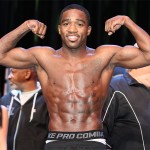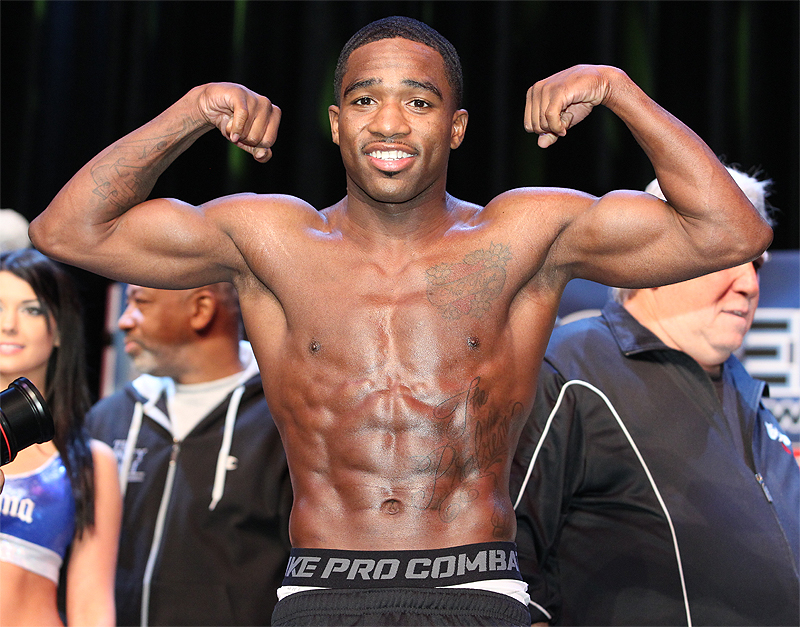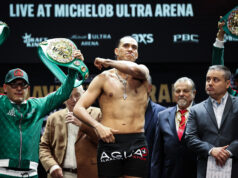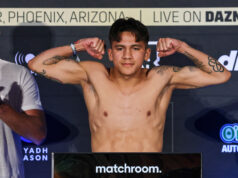
This is how Saturday ended after Adrien “The Problem” Broner defeated Gavin Rees by corner stoppage in the fifth round.
Max Kellerman: “You beat the hell out of him, would you like to see, and comment, some?”
The Problem: “I mean, everybody knows sex sells. I’m pretty. I want to keep seeing myself on TV.”
Max Kellerman: “And then in round 5?”
The Problem: “Man, I cooked him. He was underwater like a neckbone.”
Max Kellerman: “What’s your best shot?”
The Problem: “Um, my best shot is when I take a picture. Somebody take a picture of me.”
Very good writing happened last week, with Adrien Broner as its subject. Much of it, though, thinned as it progressed, both gaining and losing animus as it applied itself to the chore of Broner’s excavation. Some of it craftily ended with a shrug, other of it marched towards a preordained conclusion, a tariff for what exhaustive access brought an exhausted broadcast, Saturday, once Broner finally did the one thing he is good at, which is fighting. His prefight appearances on camera betrayed a boredom with his own shtick, a boredom arrived at him prematurely as forehead wrinkles. His previous events were preceded and succeeded, immediately, by a self-consumption that betrayed either lunacy or immaturity. If it was lunacy, “The Problem” is cured; if it was immaturity, he is now aged. Broner is not fascinated by Broner any longer – which is one attribute of Floyd Mayweather’s, a genuinely childlike enthusiasm at his own voice amplifying clichés, Broner has not borrowed.
It is not possible a person adept at interpreting the rhythms of other men’s physiques as Broner is does not sense his inquisitors’ growing boredom, and the audience boredom it anticipates. Sycophants’ overwrought mirth convinces no one, finally, and sends natural showmen to the reservoir of their own emotions. But in this sense Broner is akin to the retreaded recording characters hip-hop cynically grinded out after Dr. Dre’s solo album in 1992, guys who rapped, effectively, about how much they wanted to be like other, better guys, rappers passable in the compulsory round – rims, guns, hoes – but bereft of material for the freestyle round, the meaningful one, and ignorant of how much stock even the naivest listener placed in an element of discovery.
Broner, too, confronts an audience conundrum hip-hop’s now-anonymous laggards did not. The Mayweather shtick of which Broner is already tired was not created for aficionados; it was invented years later to capture a millionth pay-per viewer. Mayweather already had aficionados’ esteem, begrudging as it was – for retiring in only his 18th prizefight Genaro Hernandez, for dropping Diego Corrales five times, for granting Jose Luis Castillo an immediate rematch – when he later invented “Money May,” a rapacious character designed to capture revenue by fulfilling stereotypes to provoke strong reactions, beggaring what shallow plots action movies provide.
Aficionados do not go for this. They generally compose an older, smarter set enchanted by violent competition, not special effects. They make ethnic identifications but care little for biography because their identities are settled, and because they’ve been force-fed the same “boxing saved him from the streets” script often enough to know fewer than one in a 100 kids from the streets can fight a lick – rendering such biographical tidbits useless to someone thoughtfully hoping to understanding an athlete whose prowess he admires.
Mayweather had a supporting cast Broner does not yet have; a crazy dad, a crazier uncle, charismatic and accomplished opponents like Oscar De La Hoya and Ricky Hatton, and an innovative set of producers at HBO who knew more about creating documentaries than they didn’t know about boxing. Broner has a hairbrush.
He also has a hell of an idea what he is doing in a boxing ring, and while he is not quite the beast he appeared across from tiny Gavin Rees, he is good a fighter as the world has under 147 pounds. He changes men, professional fighting men, from aggressors to targets. By round 4, Saturday, he made Rees do the very thing Antonio Demarco did in his own fourth round with Broner in November: Nervously rest his head someplace Broner’s right fist couldn’t help but find it. As noticed by analyst Lee Wylie, whose deconstructions of boxing’s language are consistently excellent, Broner’s left hook, whether leading or checking, is now among the most formidable punches in prizefighting. It makes rugged men look for refuge inside it – Demarco set his head against Broner’s right glove, Rees occasionally tried Broner’s left elbow – which is the place Broner wants them, and from which he snuffs their fighting spirits.
There is nothing Broner does so well as fight, and he should stop permitting others to ask him to do more than that. Broner is now told, by folks too inexperienced to know better, he should capture aficionados with a formula invented for casual fans, to whose heights a prizefighter does not build without a sturdy and committed foundation. Thoughtless as his detractors may imagine him, Broner does sense this. The very reflex that tells him to rock away from an opponent’s right hand in the first round but step into the same punch in the fourth is one that told him to end things Saturday just as Max Kellerman crashed their postfight interview into a monitor of highlighted knockdowns. Everything about Kellerman’s comportment told Broner the episode was a flop, and better to end it. He didn’t, and discomfited sighs everywhere else were the result.
It is time for an imagined slight of some kind to make Broner stop talking. The best thing Mayweather did after the way he finished the FaceLube spokesman, in 2011, was refuse to talk about it, subsequently bending a sucker punch into a dark bit of strategizing. To the myriad of things Broner borrows from Mayweather, he should now add silence.
Bart Barry can be reached at bart.barrys.email (at) gmail.com











